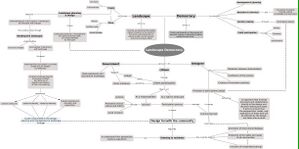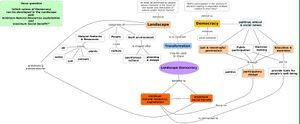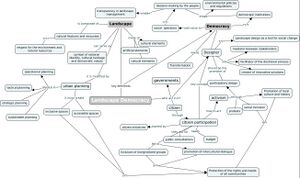Democratic Landscape Transformation 2023 - Team 1
>>> Back to working group overview
>>> Back to seminar reading list
>>> go to the Editing Help
Background of your team
We are Ludovica, Mahan, Athena and Rahaf.
Iran:
Linguistic Perspective: Persian is the official language of Iran, and it is spoken by the majority of the population.
Cultural Perspective: Iranian culture is influenced by a rich history that dates back thousands of years. Persian literature, art, music, and poetry have played a significant role in shaping the cultural identity of Iran.
Disciplinary Backgrounds: Mahan has a bachelor in architecture from the university of science and culture in Tehran, Iran. He is now a student in the IMLA program.
Italy:
Linguistic Perspective: Italian is the official language of Italy, spoken by the majority of the population. Italy also has several regional languages and dialects, such as Sicilian, Neapolitan, and Venetian but Ludovica come from Piemonte, a region in the north west, so her grandparents speak piemontese dialect.
Cultural Perspective: Italian culture is renowned for its contributions to art, literature, music, and cuisine. Italy has a rich cultural heritage, including famous historical sites, Renaissance art, opera, and a strong sense of regional identity.
Disciplinary Backgrounds: Ludovica has a bachelor degree in Architecture from Polythecnic of Turin and she is actually studying at University of Bologna in the international Master degree in 'Architecture and creative practice for the city and Landscape'.
Athena Zougra:
I am an Architect MArchSc from Greece, currently living in Athens.
I studied Architecture at the Aristotle University of Thessaloniki in Greece and I completed a Master's diploma in Architecture at the University College Dublin in Ireland, in the area of Bioclimatic Architecture and Life Cycle Analysis.
Currently, I study in the Postgraduate Programme of Harokopio University in Athens, at the Department of Geography, and I am working on my thesis on Land Use Changes and Spatial Planning.
My mother language is Greek, I am proficient in English and a beginner in French.
I have a strong research interest in architecture and the natural environment & culture, and the combination with aspects of modern society.
Rahaf Yousef: I am an architect and urban researcher from Damascus, Syria. I have a diploma in architecture from Damascus University and a master's degree in Regional Planning. With over 5 years of academic experience, I have worked as a tutor assistant and scientific coordinator for the Landscape Planning program at Damascus University. Currently, I am pursuing a Ph.D. at MATE University in Budapest, Hungary, specializing in landscape protection and reclamation. I am fluent in Arabic, proficient in English, and have beginner-level proficiency in French.
Your Landscape Democracy Manifestoes
Here you can add links to the manifestoes we presented on April 26:
- Casalone Ludovica: https://drive.google.com/file/d/16Hj_ImvWgB5HOftxqGySfydNrJ-tRy5n/view?usp=sharing
- Athena Zougra/ Patission Str, Athens, Greece: https://drive.google.com/file/d/12g8KBBkbco2QRJeQts9mIRo5u6rOLeN7/view?usp=sharing
- Mahan Esmaeili Zavieh: https://drive.google.com/file/d/1AgoO7eg47hAN4ZIhFbt3VHw3fft5tr22/view?usp=sharing
- Rahaf Yousef: https://drive.google.com/file/d/1W5ondJiifStHtioO99ytvSqZ6nkAuJKK/view?usp=share_link
Examples of Landscape Activism
In the session on May 10th we discussed examples of landscape activism from ourown contexts. We share the examples in this section (link, image and/or short explanation).
Athena Zougra/ Drakopoulou Estate, Athens, Greece: https://drive.google.com/file/d/1Q9VCwcYCjOH3lltyymlrEXGY1X2OMz7Q/view?usp=sharing
Athena Zougra/ Drakopoulou Estate, Athens, Greece: https://drive.google.com/file/d/1AzdzUORD_LEeilTmjg5HCcOYKsBIu6P3/view?usp=sharing
Casalone Ludovica/ Stalker Project, Italy: https://drive.google.com/file/d/1blhduE5V-YyOkyqiL5SagzRXOxJ7_GI4/view?usp=share_link
The Role Play
In the session on May 17th we presented a small role play with your team. This is a short reflection on what we have learned from this play-the short list of landscape democracy 'movers and shakers' can be found here:
Team Challenge: citizen's participation
Activist Designer:
Athena Zougra/Hassan Fathy: https://drive.google.com/file/d/12DAzpBdkuRM9BhmzqtyO9O0VcWco4RQh/view?usp=share_link
Casalone Ludovica/Ezio Manzini: https://drive.google.com/file/d/10Mw95ogs_6TICUtYLZ-6oNHR5qIT3HNp/view?usp=drive_link
Mahan Esmaeili Zavieh/Christopher Alexander: https://drive.google.com/file/d/1VfLtzDMVu_oXi72c9k_h974uhp0wHAFp/view?usp=drive_link
Rahaf Yousef/ James Rojas: https://drive.google.com/file/d/1W1UTtw6vdiC7VAsq4Q6PnoAoS1AuXaFU/view?usp=drive_link
>>> All information on the phase B activities is compiled in this PDF
Readings, concepts and definitions
- Start: April 5, 2023
- Due: July 5, 2023
Working in your group, express your personal understanding of the relation of landscape and democracy in the form of a concept map with linking words or any other diagrammatic representation. Please make your maps very visual and not just verbal. Think critically about why one map differs from another
About concept mapping
Before starting the exercise you can read this article by Joseph D. Novak & Alberto J. Cañas about Theory Underlying Concept Maps and How to Construct and Use Them. This paper gives a good explanation of how concept maps are conceived and developed.
You can use any tool you like for producing your concept map. However, since the result needs to be submitted digitally we recommend the following open source software for producing your maps:
- Cmap Tools >>> you can also work with your group on the Cmap cloud doing a shared map
- VUE - The Visual Understanding Environment
Please add your concept map(s) here
- Possible format: JPG (for wiki upload) or link to any other resource
- You may add one map per team member or an integrated one[1]
- add as many additional materials as you need
Please finish with a short reflection
- What are the similarities and differences in your team regarding your understanding of what democratic landscape transformation is?
Similarities:
1. The importance of democratic principles such as freedom of speech, human rights, and equal representation,
2. Addressing contemporary challenges, such as political polarization, social inequality, or the impact of technology
3. That current democratic systems have limitations and may not fully represent or serve the diverse needs and aspirations of the population
Differences:
1. Priorities and aspects
2. Strategies
3. Cultural and Historical Context
- In how far did the seminar lectures and readings help you to clarify this?
Conceptual understanding, case studies (manifestos), the debates, frameworks and tools and the discussions
- What will you take home from this seminar?
We would take home a comprehensive understanding of landscape democracy principles and approaches,
insights from real-world case studies, and practical tools for inclusive decision-making and collaborative landscape governance.
It inspired us to take action in promoting landscape democracy and foster connections with like-minded individuals for potential future collaborations.
We may also integrate this experience and knowledge into other studies.
- ↑ _


